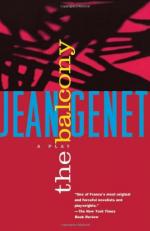|
This section contains 5,604 words (approx. 19 pages at 300 words per page) |

|
SOURCE: Cook, Rufus. “Quest for Immobility: The Identification of Being and Non-Being in Jean Genet's The Balcony.” In Myths and Realities of Contemporary French Theater: Comparative Views, edited by Patricia M. Hopkins and Wendell M. Aycock, pp. 115-27. Lubbock, Tex.: Texas Tech Press, 1985.
In the following essay, Cook explores the connection between the form of The Balcony and the philosophical assumptions that underlie it.
In the seventh scene of Jean Genet's The Balcony, the Court Envoy, speaking of Arthur who is now dead (“the way one dies here”), says: “He was, like us, haunted by a quest of immobility. By what we call the hieratic.”1 On the next page, the Envoy attributes the same motive to the Queen: “She, too, is moving rapidly towards immobility” (p. 62). This quest for immobility—for what might be called the absolute or pure being—is a central motive in Genet's play and...
|
This section contains 5,604 words (approx. 19 pages at 300 words per page) |

|


